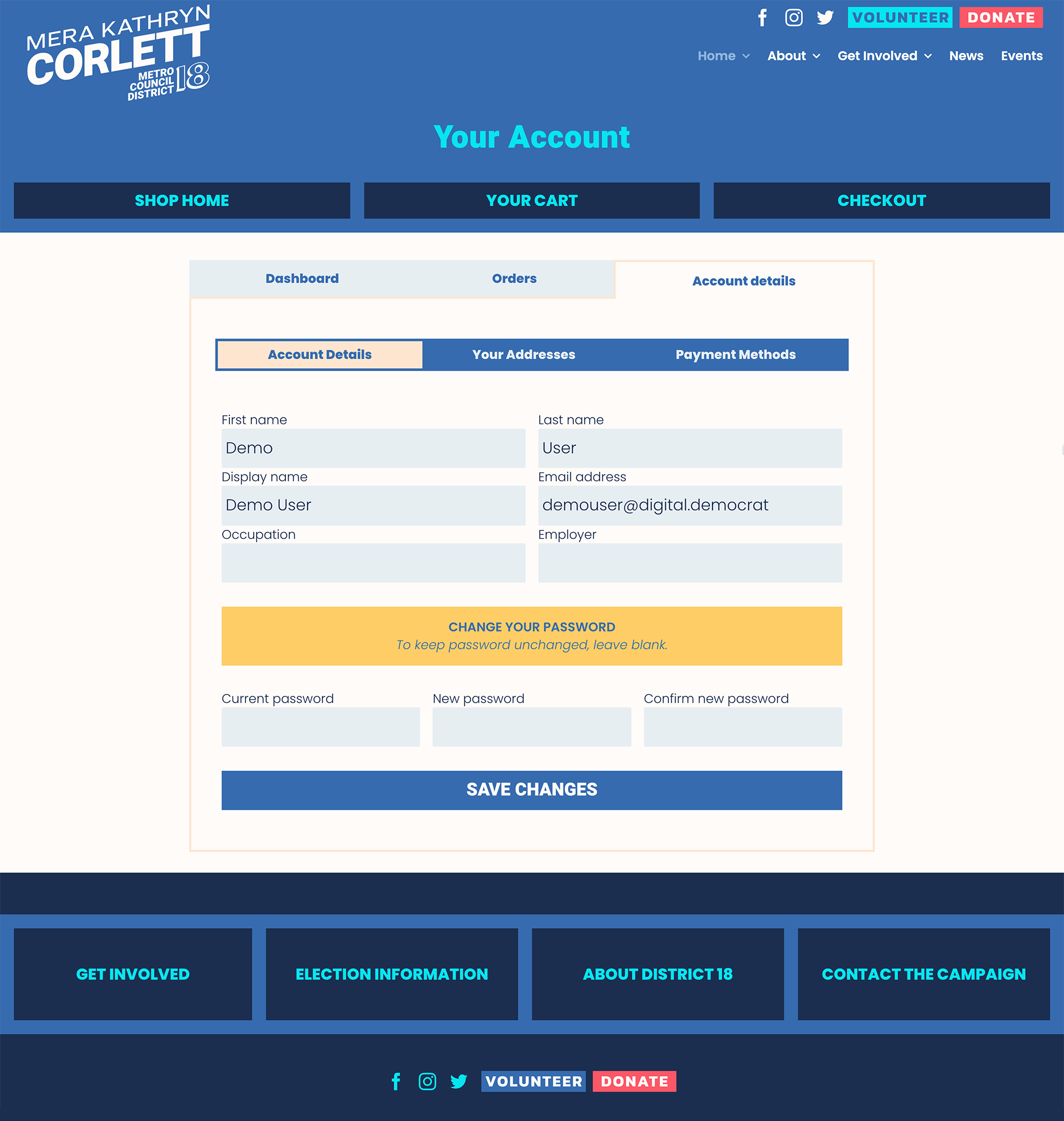Integrated E-Commerce
WHAT IT IS:
A custom designed online store, built seamlessly into the campaign’s website. This provides an unbeatable user experience, gives the campaign more control over online merch sales, and maximizes profit margins. Also, it’s enabled with enhanced e-commerce analytics.
For most campaigns, it’s just not worth the trouble of designing merch and figuring out how to set up a separately hosted online shop like Shopify. It’s even less of a worthwhile endeavor to outsource it to a 3rd-party company, like some bumper sticker company in Texas, for example. The profit margins end up being thin, fulfillment is really slow, and there’s an unnecessary intermediary between you and your supporters. It’s a wasted opportunity to build stronger relationships and raise more money.
This is a better way of doing an online campaign shop, with full e-commerce functionality built right into the campaign’s website. This makes it easy to manage products and fulfillment locally. It’s simple enough that shop management could be delegated to interns, but also sophisticated enough for larger campaigns that might even bring on consultants or a design agency to handle the product design & production (and perhaps also marketing & customer service). Anyone taking on these tasks can be given limited admin access to the website as a “Shop Manager” (more on admin user roles).
This e-commerce solution is custom-built with the features that campaigns needs to operate their own online campaign shop. For example:
- Premium marketing automation, including features like dynamic coupons, refer-a-friend, follow-up emails, abandoned cart remarketing, etc.
- Fulfillment features such as local pickup, custom shipment options, shipment tracking, and invoice/ packing list/ shipping label printing.
- Front-end product features like quick view, inventory management (i.e. notifications on a product page like “Only 2 items left!”), pre-orders, dynamic Apple Pay/ Google Pay buttons, and more.
- Event Ticket Sales (Integrated with the Events Platform)
- Enhanced e-commerce analytics and integration with digital advertising platforms like Google Ads and Facebook.
Enhanced e-commerce analytics provides additional information related to how users interact with the website’s shop, like their specific shopping behavior leading up to a purchase. E-commerce metrics might include (but aren’t limited to):
- Product views and clicks
- Product detail page views
- Shopping cart additions, changes, and abandonment
- Use of promotions (i.e. coupon codes)
- Purchase activity
- Transaction value and items per transaction
Consider this potential use case— A campaign could not only configure local pickup options for their HQ office or field offices, but also list upcoming events as options for “local pickup.” This way, when someone RSVPs (or buys a ticket) for an event, there could be a section in the confirmation email about campaign merch for sale, available for pickup at the event. Then, when the user checks in at the event by scanning the QR code in their email, that would immediately trigger another email welcoming them to the event with any relevant info, and also a reminder to visit the campaign website to buy some merch and pick it up right away at the event’s merch table.
Take a look around this demo of the front-end shop pages. You can add something to the cart to see the cart and checkout pages. You’ll notice how the shop pages are seamlessly integrated into the website by keeping the design and color scheme consistent. For a peek at the account pages for a logged-in user, check out these screenshots.
WHY IT MATTERS:
Just like the benefits of using native forms, built-in e-commerce functionality provides a much better user experience than a 3rd-party platform disconnected from the campaign’s website. Along with the higher level of control of the shop, you’ll be armed with the insights from enhanced e-commerce analytics to optimize your e-commerce strategy, driving more sales and increasing profit. There are even ways to connect your Google and Facebook advertising accounts in order to optimize e-commerce ad campaigns. And by running ads linked to your website’s shop pages on your verified domain (as opposed to a 3rd party site), it’s easier to achieve a lower CPC/ CPM and a much higher ROAS.
This approach empowers the campaign with much more control over how the e-commerce operation and fulfillment is managed. A bigger campaign might still opt to outsource the merch design and online store management to a consultant or agency, but the admin dashboard is easy enough for anyone to use.
Also, the Campaign Shop’s branded transactional emails will further reinforce the campaign’s brand identity and user’s brand loyalty.
We could go on and on, but here’s the big idea— these integrated e-commerce features help campaigns connect more meaningfully with their audience, move more merch, amplify their message, maximize e-commerce profit margins, and raise more money.

